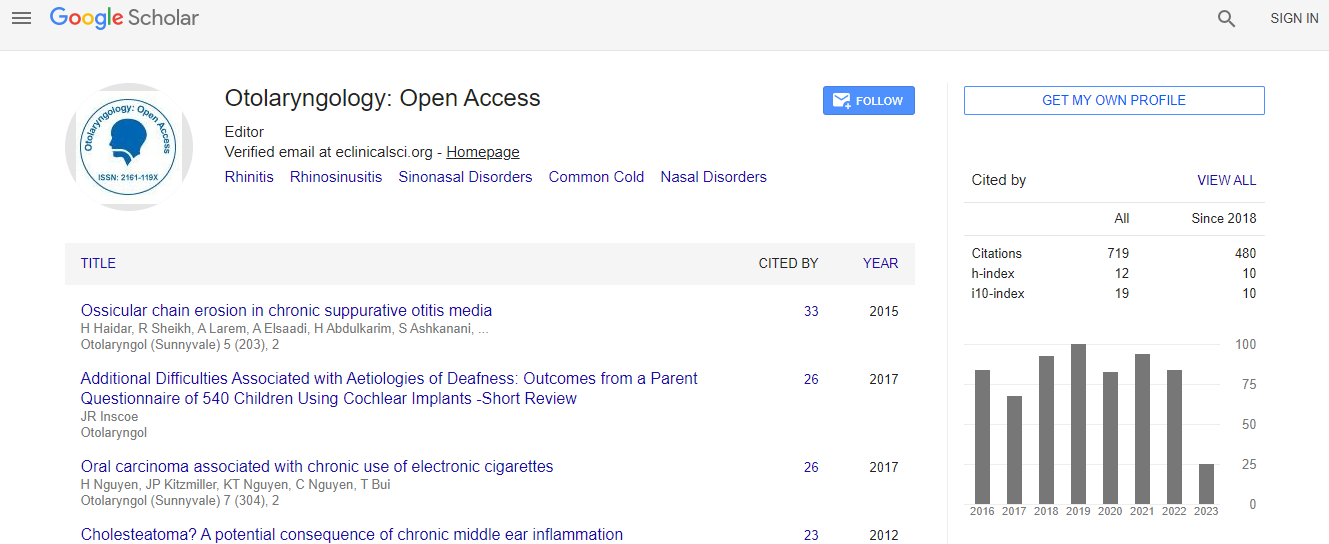Our Group organises 3000+ Global Conferenceseries Events every year across USA, Europe & Asia with support from 1000 more scientific Societies and Publishes 700+ Open Access Journals which contains over 50000 eminent personalities, reputed scientists as editorial board members.
Open Access Journals gaining more Readers and Citations
700 Journals and 15,000,000 Readers Each Journal is getting 25,000+ Readers
Google Scholar citation report
Citations : 925
Otolaryngology: Open Access received 925 citations as per Google Scholar report
Otolaryngology: Open Access peer review process verified at publons
Indexed In
- Index Copernicus
- Google Scholar
- Sherpa Romeo
- Open J Gate
- Genamics JournalSeek
- RefSeek
- Hamdard University
- EBSCO A-Z
- OCLC- WorldCat
- Publons
- Geneva Foundation for Medical Education and Research
- ICMJE
Useful Links
Recommended Journals
Related Subjects
Share This Page
Remote assessment of ear and hearing conditions
3rd International Conference and Exhibition on Rhinology & Otology
Julian Hamann
Cupris Health, UK
Posters & Accepted Abstracts: Otolaryngology
Abstract
The diagnosis and monitoring of ear related problems usually requires examination of the ear and a hearing test and this is currently carried out at the GP surgery or in outpatient clinics, as existing equipment is not suitable for remote use. Bringing care closer to home could significantly improve the patient�s experience and prevent unnecessary trips to the hospital. It�s particularly important for parents as 90% of children have an ear condition before the age of 6 and 50% of those are recurring. It�s estimated that 30-40% of people with learning disabilities (PWLD) have significant hearing loss and this particularly vulnerable population can find the process of attending an appointment and the subsequent examination difficult, intrusive and can cause anxiety. This results in many PWLD remaining undiagnosed and unaware of their condition. Medway NHS Foundation Trust is launching a trial to evaluate Cupris� novel digital system to allow the remote diagnosis and monitoring of ear conditions. It comprises: A smart-phone connected otoscope that allows clinical images of the eardrum to be taken; An inapp hearing screening test conducted on the smart-phone and a communication platform (app and website) to enhance communications between healthcare stakeholders, including the patient. The users can capture clinical images of patient conditions using their smart-phones, add information using skip-logic questionnaires, audio recordings, text input and other tools built into the smart-phone app, securely connect with other Cupris Health users to share cases with them through the cloud service and discuss and monitor patient cases and receive diagnoses of patient conditions without seeing patients in person. The study will be conducted over 6 months in different settings: GP practices, care homes, ENT clinics and patients� homes. It will assess the quality of the Cupris device (otoscope and hearing screening test) as well as the communication system on several aspects: impact on the patient�s healthcare experience, acceptability for patients and healthcare professionals, health economic impact and number of appointments that could be prevented. The communication software assessment will be run on two main streams: primary care (carer or patient contacting GP) and secondary care (GP referring to ENT specialist). Cupris digital health technology will improve healthcare delivery by making it easier and more efficient and by enabling better communication between healthcare professionals and non-healthcare professionals. It is expected that it will show a significant reduction in the number of unnecessary referrals or avoidable appointments. It will give patients the opportunity to receive a diagnosis from the comfort of their home or closer to their home, as well as empowering both patients and non-specialist healthcare-professionals by enabling them to visualize conditions, understand them better and have greater transparency with the overall treatment.Biography
Email: jules@cupris.com

 Spanish
Spanish  Chinese
Chinese  Russian
Russian  German
German  French
French  Japanese
Japanese  Portuguese
Portuguese  Hindi
Hindi 
